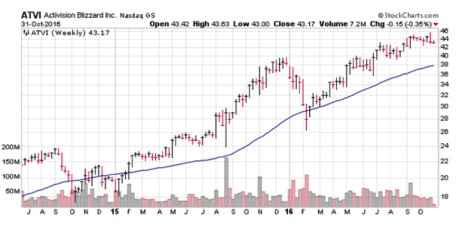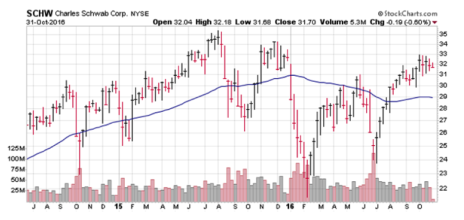Barron’s Next 50 Index: Millennial Stocks
Are you frustrated by the recent swoon in drug and biotech stocks? Millions of baby boomers are reaching the age of 65, which should lead to a surge in sales and earnings for most companies in the health care industry. Investors have done an about-face, though, because of fears that pressure to bring health care costs down will be ratcheted up, no matter who is elected U.S. President. Stay tuned—the battle to control health care costs could get ugly.
So where do you invest your hard-earned savings and retirement account dollars now? Try millennial stocks.
The stock market seems to have become a minefield with no safe place to step. Energy stocks have rebounded to some degree, but will they move higher if oil production exceeds demand and prices continue in the $40 to $60 per barrel range for the foreseeable future?
Another concern about where to invest safely is whether the U.S. dollar will remain strong, putting a damper on the sales and earnings growth of U.S. companies, many of whom derive a lot of their business from overseas.
And the list goes on and on.
If you are wondering where to invest, the answer might be quite simple. Barron’s, a division of The Wall Street Journal, has created an index of 50 companies that they call the “Next 50.” The companies in the index aim to reshape American life through innovation in social media, technology, entertainment, travel and shopping. The Next 50 includes companies that offer products and services used by millennials, born between 1980 and 2000 (hence the term, millennial stocks).
After studying the 50 companies included in the Next 50 Index, I found many companies that are growing at a rapid pace because all 50 are outstanding companies in the leading industries of the future. Millennials will spend heavily on the products and services that these companies will provide for the next several decades. Buying some of these millennial stocks now could pay off handsomely during the next several years, or even decades.
For the Next 50 companies, Barron’s back-tested performance results for the past five-year and 10-year periods—with exceptional results. The results are hypothetical (because the companies do not have five- and 10-year histories), but during the past five years, the Next 50 stocks outperformed the Standard & Poor’s 500 Index by 12% per year. During the past 10 years, the Next 50 surged nearly 350% compared to the S&P 500’s increase of 50%.
Valuations are high, of course, as high price-to-earnings ratios are common for companies with extraordinary future prospects. The Next 50 companies are expected to grow earnings at a 16.2% median pace during the next five years. The median P/E for companies in the Next 50 Index is 29.3, based on current earnings per share. Many of the stocks seem overvalued, but some are undervalued stocks.
Two Next 50 Stocks Stand Out
Two companies stand out in the Next 50 Index: Activision Blizzard (ATVI) and Charles Schwab (SCHW). The former is decidedly a millennial stock.
Activision Blizzard (ATVI) is an international publisher of interactive entertainment software products. The company was formed in July 2008 when Activision merged with Vivendi Games. Activision was a leading developer of video games for game consoles, hand-held platforms and personal computers. Vivendi Games was a global developer of interactive entertainment and the leader in the multi-player online role-playing games segment. Vivendi has retained a 12% stake in Activision Blizzard.
Activision owns several of the world’s top game franchises, including World of Warcraft, Call of Duty, Skylanders, StarCraft and Diablo. The company also has a long-term exclusive license for certain Marvel Enterprises comic book characters, including Spider-Man and X-Men.
Activision acquired King Digital in February 2016. King is best known for its super popular Candy Crush games and had nearly 500 million monthly active users for its mobile-focused games. Activision now has global scale, multiple strong franchises, and growing digital offerings.
Sales likely advanced 19% and EPS (earnings per share) climbed 16% during the 12 months ended September 30, 2016. Results were bolstered by the purchase of King Digital. Sales will surge another 16% to $6.7 billion and EPS will increase 22% to $2.10 during the next 12 months ending September 30, 2017. Sales and earnings growth is accelerating, and analysts are raising earnings estimates for the next several quarters. In addition, Activision beat analyst EPS estimates by 28% and 95% in the last two quarters.
At 20.5 times next 12-month $2.10 EPS and with a small dividend yield of 0.6%, ATVI shares are undervalued. Activision is expected to increase EPS at a 17.6% pace during the next five years. The company maintains a strong balance sheet. Activision will report third quarter financial results on November 3.
I recommend that you buy ATVI shares at the current price.
Charles Schwab (SCHW) is one of the largest brokerage firms in the U.S., primarily serving retail clients. Schwab engages in wealth management, securities brokerage, banking, money management and financial advisory services. The company provides financial services to individuals and institutional clients through two segments: Investor Services and Advisor Services.
Investor Services offers retail brokerage and banking services, retirement plan services and other corporate brokerage services. Advisor Services provides custodial, trading and support services. Schwab offers a range of products to address the investment and financial needs of individuals. Its product offerings include brokerage, mutual funds, exchange-traded funds, advice solutions, banking and trust.
Charles Schwab depends on short-term interest rates, as nearly 40% of the company’s revenue came from net interest income in 2015 versus 37.5% in 2014. Earnings could rise noticeably after the Federal Reserve raises short-term interest rates.
Sales advanced 15% and EPS climbed 18% during the 12 months ended September 30, 2016. Growth accelerated in the recently reported third quarter with sales rising 20% and EPS surging 25%. Sales will likely rise 6% and EPS will advance 19% to $1.40 in the 12 months ending September 30, 2017. If interest rates rise at a faster pace during the next 12 months, sales and earnings could rise more than forecast. The company’s 22.5 P/E ratio based on forecast EPS is reasonable. Earnings will likely increase 22.4% per year during the next five years or more.
Schwab beat analyst estimates for sales and earnings in the last several quarters. Analysts have raised their forecasts for the next four quarters. Buy at the current price if you can tolerate SCHW’s inherent volatile price swings. And for further updates, take a trial subscription to Cabot Benjamin Graham Value Investor by clicking here.
Until next time, be kind and friendly to everyone you meet.


